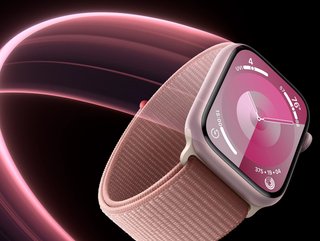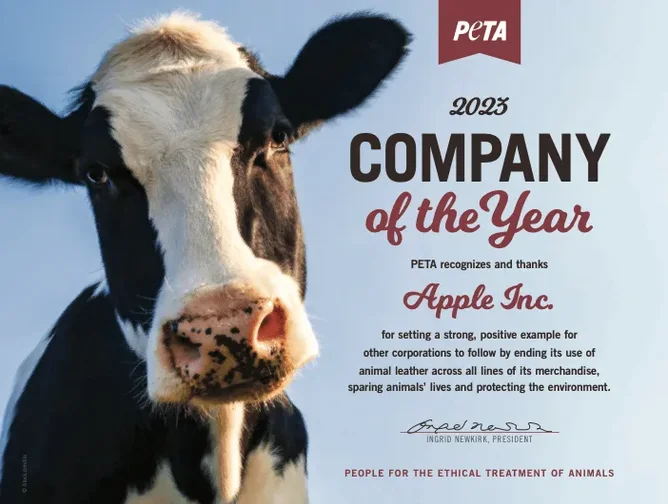Apple’s leading sustainability pledges earn PETA recognition

As the world’s biggest and arguably most innovative company, Apple is used to winning awards.
But its latest accolade is not the usual suspect in recognising the company’s innovative tech, nor its visionary leadership – instead, a landmark decision taken by Apple to ditch leather on its entire line of accessories.
Apple has been awarded Company of the Year 2023 by PETA, the world’s largest animal rights organisation known for its uncompromising, unwavering views on animal rights – and for its bold and compelling marketing campaigns.
The award is given annually to a company PETA sees as taking action to resolve animal cruelty or promote animal welfare.
Previous award winners include obvious choices like vegan meat producer Beyond Meat, along with less obvious ones such as WeWork, which secured the award in 2017 for its decision to ban meat at events; and Netflix in 2018, for airing documentaries on animal abuse in various industries.
For PETA, Apple’s decision in September to phase out leather across its smartwatch straps, wallets and phone cases, and replace leather with innovative vegan materials was a major “win for animals” and sent a “clear message to other companies that compassion is good for business”, say Ingrid Newkirk, PETA’s President.

Some may consider Apple’s decision to ditch leather as simply a business move, given the rise in ethical and sustainable consumption among younger generations – and the popularity of its smartwatches with the youth. In 2022, the brand old more than 50 million smartwatches.
In the past five years, global searches for sustainable goods have increased by 71% with surveys indicating that a vast majority of shoppers care about the environmental impact of the products they buy.
Newkirk argues Apple’s move is a case of corporate consciousness.
“Apple’s decision is more than just a switch in materials. It reflects a growing awareness of animal welfare issues and a commitment to creating a more humane future.”
Switch to leather-free alternatives on rise
Leather has long been a fashion industry staple. Used in everything from bags to shoes, watch straps to jackets, leather continues to dominate the accessories landscape.
Increasingly though, alternatives to leather are taking centrestage, as ethical consumption rises. From pollution to high carbon emissions, along with alleged malpractices in slaughterhouses, the leather industry is receiving pushback from all corners and public opinion is changing around the use of leather.
A 2019 survey from Vogue Business found that 37% of consumers in the UK and 23% in the US are opposed to the use of any kind of leather in clothes.
And brands are listening. Taking the lead on cruelty-free alternative materials, socially conscious fashion pioneer Stella McCartney was the first luxury house to never use animal leather, fathers, fur or skins.
Instead, Stella McCartney uses Mylo, made from mushroom roots, in its collections.
Other big-name brands are also tapping the many innovative leather-free alternatives now on the market – many of which are based on plants or mushrooms.
Like Stella McCartney, Hermes ha be working with MycoWorks to replace some of its pieces with mushroom leather, while another mushroom leather company Bolt Threads supplies mushroom leather to Adidas and lululemon.
Chanel and Hugo Boss now both use Pinatex, a pineapple-based leather in its handbags.
For Apple, ‘FineWoven’ is the material of choice – an elegant and durable twill made from 68% post-consumer recycled content that delivers a soft, suede-like feel.
The vegan fashion market is estimated to rise US$835.7 billion by 2030, with a CAGR of 7.1% from 2022-2030.
Apple’s ambitious 2030 climate objective
Stopping leather in all its products is part of Apple’s ambitious 2030 climate objective. to make its products carbon neutral by the end of 2030 – including the entire global suppy chain and the lifetime use of every device Apple makes.
In September, Apple reached a milestone in its journey towards its ambitious goal with the launch of its first-ever carbon neutral products in the Apple Watch lineup.
According to the company, each carbon-neutral Apple Watch model meets the following strict criteria – 100% clean electricity for manufacturing and product use, 30% recycled or renewable material by weight, and 50%of shipping without the use of air transportation.
These combined efforts result in at least a 75 percent reduction in product emissions for each model.
"We’ve achieved an important milestone in making the world’s most popular watch carbon neutral -- and we will keep innovating to meet the urgency of the moment," Lisa Jackson, Apple’s VP of Environment, Policy, and Social Initiatives, said in a statement.
The tech titan is also accelerating progress toward plastic-free packaging by 2025. As well as achieving the first 100% fibre-based packaging for the new Apple Watch and band lineup, the packaging for every iPhone 15 model is over 99% fibre-based, according to the company.
Beyond 2030, Apple is also working toward a 90% reduction in emissions by 2050.






